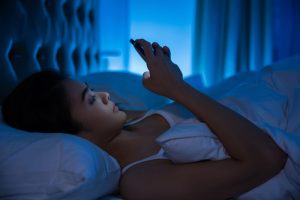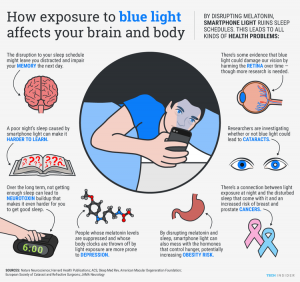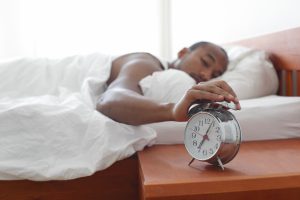
Credit: Shutterstock – New York Post Article
https://nypost.com/2016/06/24/using-your-iphone-in-bed-can-make-you-go-temporarily-blind/
An easy way to wind down right before bed usually involves picking up your cell phone, which then results in being stuck in an endless loop of memes. There’s a lot of studies out there that mention how using your phone right before you sleep can disrupt regular sleeping patterns, but what if I also told you the blue light you are exposed to from the screens, especially at night, may contribute to the increased risk of cancer, diabetes, heart disease, and obesity?
How Does Blue Light Affect our Sleep?
In this video, Dr. Dan Siegel, a professor of psychiatry from UCLA School of Medicine, explains how harmful the effects can be when using any sort of device with a blue light screen right before sleeping.
Video Created by: Science Insider
Dr. Siegel explains that looking at a phone screen is like having a stream of light particles telling your brain to stay awake. The light tells tells your brain to inhibit melatonin secretion (a hormone that controls your daily sleep-wake cycle) which helps you fall asleep at night. It is found that sleep is important for us because it allows our active neurons (a cell that carries electric impulses in the brain) to rest and brings in supportive cells to help clean out toxins that the neurons produce. Without this process, we would have awful memory, inability to function, and low energy throughout the day.
Research Study on Effects of Blue Light
A study from Harvard explained that blue light is actually very beneficial during daylight hours as it can increase your attention span, reaction times, and state of mind. But in contrast, it can trouble your sleep at night and possibly be a factor in increasing other health risks. There isn’t enough proof that blue light exposure at night is for sure the cause of cancer, diabetes, heart disease, and obesity. But, what is known is that melatonin levels, when exposed to the blue light, may affect our 24-hour cycle, called the circadian rhythm, which is important in determining 0ur sleeping and eating patterns. The Harvard study conducted an experiment comparing the difference in melatonin levels when exposed to 6.5 hours of blue light to green light. The results showed melatonin suppression was twice as long from blue light than green light exposure, including shifting the circadian rhythm by twice as much. Blue light is a suppressor of melatonin, which evidence has shown that low levels of this hormone is found to be correlated with cancer.

Credit: Skye Gould/Tech Insider
https://www.businessinsider.com/how-smartphone-light-affects-your-brain-and-body-2015-9
The effects of blue light coming off our screens prior to sleeping are very serious! We’re all sometimes guilty of using our electronic devices before going to bed, but we should try to break this habit and finally listen to science!
Loretta Huang
Blog Post #2

